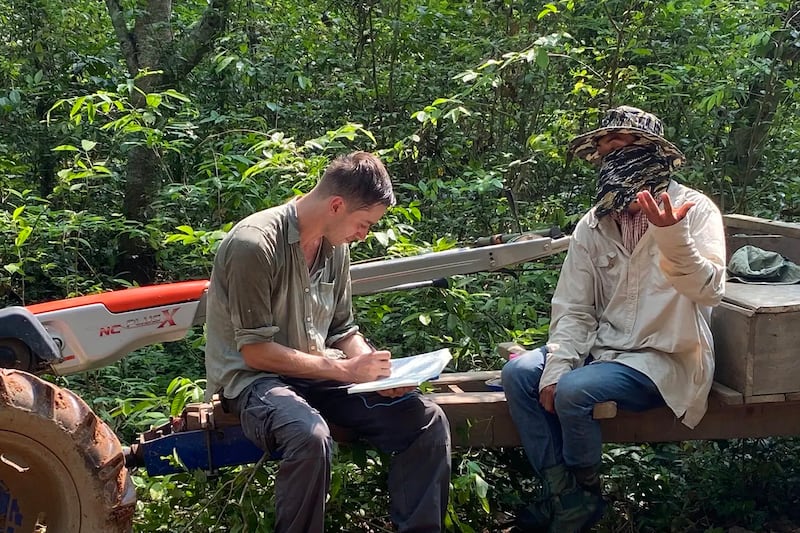A British journalist who was recently denied entry to Cambodia told Radio Free Asia on Thursday that reporting on the country’s environmental problems will continue – even with the government’s ongoing efforts to crack down on dissent.
Gerald Flynn flew into Siem Reap International Airport on Jan. 5 after a short vacation and was turned away by immigration authorities who said he was added to a blacklist on Nov. 25.
Flynn, 33, who has lived in Cambodia since 2019, has reported extensively about deforestation in the Prey Lang Wildlife Sanctuary, illegal fishing and the failure of a global carbon credit program.
“Obviously, it’s pretty crazy when your whole life gets ripped out from under you,” he said. “But I think wherever I end up, you know, this situation is not going to deter me from reporting on Cambodia’s environmental issues.”
The Cambodian government has consistently denied allegations made in Flynn’s articles, which have been published in local and international media.
The decision to add Flynn to a blacklist apparently came days after the airing of a documentary on international television network France24 that criticized Cambodia’s carbon offsetting efforts. Flynn was interviewed in the documentary, which first appeared on Nov. 22.

In separate statements, the Ministry of Environment and international nonprofit organization Wildlife Alliance both called the documentary “fake news.” However, neither statement “detailed specific factual errors or inaccuracies in the report,” according to the Committee to Protect Journalists.
“It’s very hard to see this as anything really but retaliation for my journalistic work,” Flynn told RFA. “There was minimal explanation from the authorities at the airport.”
Flynn said his work visa was valid until early February, but immigration officials told him that a document on his last visa application was incorrect.
“They couldn’t tell me which documents or what the problem was,” he said. “Since then, the Immigration Department has written to my embassy and told them that I was denied entry to Cambodia because I had applied to work for it as an electrician, which is a bizarre claim.”
Cambodian journalists targeted
It’s rare for foreign journalists to be denied entry into Cambodia, but the country has seen a significant erosion of media freedom in recent years, with journalists regularly facing harassment and independent news outlets increasingly shuttered by fiat or pressure.
Last month, two Cambodian reporters were arrested in Phnom Penh and charged with incitement after they posted a video online that they said showed people being tortured inside a scam compound.
In November, veteran reporter Chhoeung Chheng was fatally shot in Siem Reap province as he traveled by motorbike toward the Boeung Per Wildlife Sanctuary.
In September, journalist Mech Dara was arrested while traveling between Sihanoukville and Phnom Penh. Incitement charges against him were based on several social media posts and drew significant criticism from human rights groups and foreign governments.
Mech Dara was known for his hard-hitting reporting on cyber-scam compounds and human trafficking. He later made a public apology and stated that he would retire from journalism.
Since 1994, at least 15 journalists have been killed in Cambodia, according to the Cambodian Center for Human Rights. Twelve of them were working on stories that could have posed a direct threat to powerful Cambodians, the center said.
Flynn is president of the Overseas Press Club of Cambodia, which said in a statement that blocking his entry was “yet another example of the Cambodian authorities’ intolerance of critical and investigative journalism.”
The statement was endorsed by 21 regional press freedom and human rights groups, including Human Rights Watch, Reporters Without Borders and the Cambodian Journalists Alliance Association, also known as CamboJA.
RFA was unable to reach Ministry of Information spokesman Tep Oscharith for comment this week.
National Police spokesperson Chhay Kimkhoeun hung up when contacted by RFA. But he told CamboJA that foreigners who are banned from Cambodia are “either terrorists, spies, or criminals.”
Prey Lang illegal logging
Freelance journalist Pry Nehru, who has worked with Flynn, said the ban will only increase deforestation and the destruction of natural resources in Cambodia.
“Many investigative reports, in many places, in many regions in Cambodia, will not be discussed and brought to the attention of the general public, policymakers, or the government to understand what is happening,” he said.
Also this week, environmental activists in the Prey Lang Wildlife Sanctuary have discovered more than 50 new cases of illegal logging.
Activists told RFA that they saw large trees ranging from 40 centimeters (16 inches) to 90 centimeters (3 feet) in diameter. The trees had recently been cut and were lying on the ground, they said.
RELATED STORIES
Activist: Mining companies clearing forest inside Cambodian wildlife sanctuary
Cambodian reporter shot while investigating logging at wildlife sanctuary
Award-winning Cambodian journalist jailed for ‘incitement’
Indigenous minorities criminalized in Cambodia’s flagship carbon offset
Flynn has reported extensively from the sanctuary, which was created in 2016 and covers nearly 490,000 hectares (1.2 million acres) across four provinces in northern Cambodia. The sanctuary includes mainland Southeast Asia’s largest lowland evergreen rainforest.
He told RFA that the government “needs to figure out that silencing journalists” isn’t a solution to Cambodia’s issues.
“And, you know, me being banned from the country is not going to stop information from getting out,” he said. “People will still find ways to make this public, whether it’s me or somebody else.”
Translated by Sum Sok Ry. Edited by Matt Reed and Malcolm Foster.
